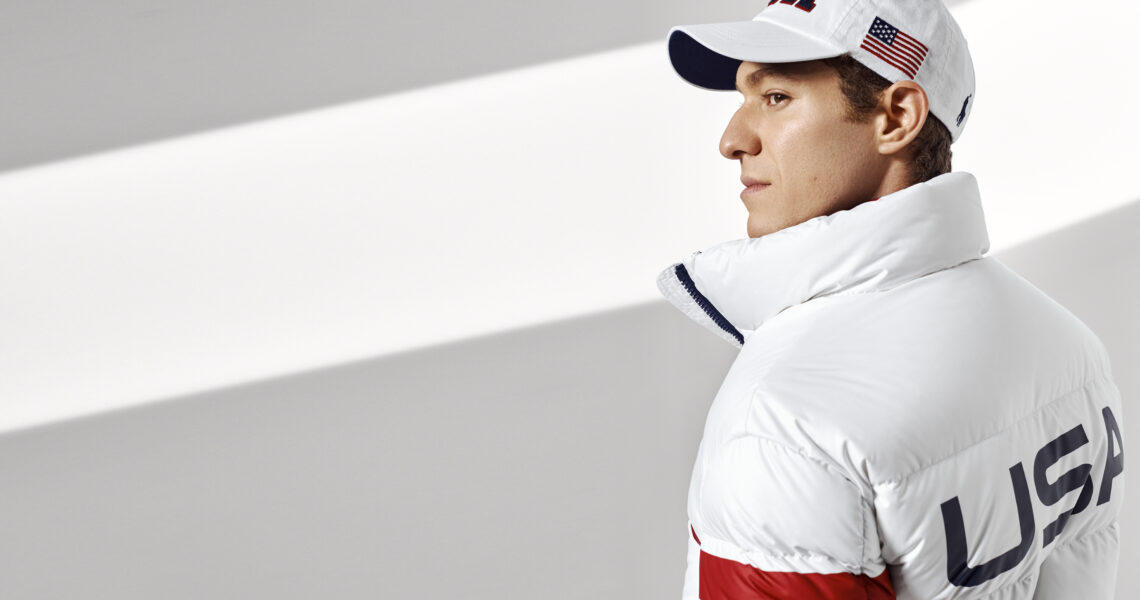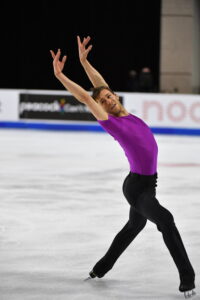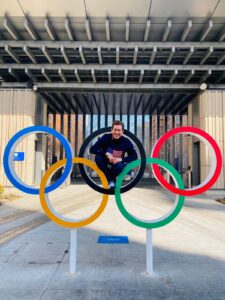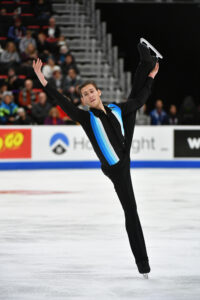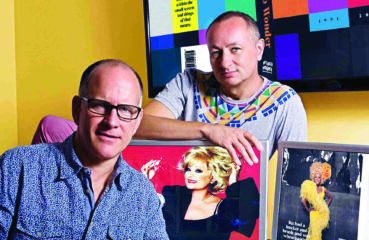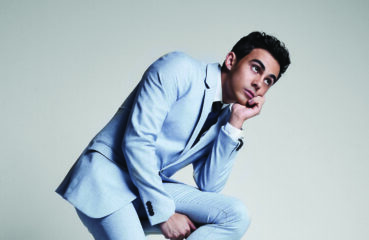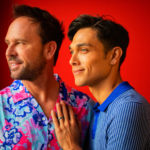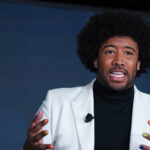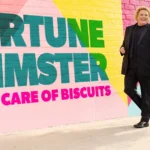Fresh from his performance at the 2022 Winter Olympics in Beijing, newly out figure skater Jason Brown talks to Metrosource about what it takes to excel as an Olympic figure skater and those he relies on to bring his vision to life. The 27-year-old phenom has been captivating and enthralling audiences for over a decade, but it was his spellbinding skate to Riverdance in 2013 at the age of 19 that catapulted him into the spotlight and his first Olympic competition. Brown made headlines of a different sort when he came out as gay via Instagram in 2021 in the midst of the pandemic. During our Zoom chat, we discussed all this and more including what other coveted trophy he’s vying for outside the world of figure skating.
While most of us will never know what it feels like to land a triple salchow, I asked Jason if he was able to put into words what it feels like when he’s on the ice, seemingly defying gravity. I asked if it’s akin to being a bird in flight.
It’s one of those funny things where if you think too hard about what we do, it doesn’t make sense. You’re going into a jump and thinking, I need to get my body up in the air, rotate three or four times, land on a blade that’s like a centimeter wide. It’s hard to fathom – it’s definitely something where you just go into autopilot. But I like your analogy about feeling like a bird in flight. I dream about what it would be like to fly like a bird. I would just have to say that it’s a sensation where you’re suspended in air and you feel the rotation, you feel the wind around you. You pull in as tight as you can, and you’re really just focused on finding the ground with your blade. Especially with spinning – you’re so focused on keeping your center and finding the balance point on the blade that you’re more focused on that and keeping your head on straight.
Talk to me about your Riverdance program. Was that a significant change for you?
One hundred percent. It was a huge turning point in my career. It was my first-year senior internationally. On your first senior international season, to make an Olympic team is mind-blowing. Everything just culminated at the right time, at the right place and ended up being my first national podium and then on the Olympic team. And doing it with that program was so special.
I saw some footage online about your initial reaction when your choreographer first suggested skating to the song and how daunting that was at first. How long did it take before it was performance ready?
We started in the spring, and it really came together at the U.S. Championship that next January. It was a long process, but it was so rewarding and so much fun to work through.
How much of skating is psychological and how much is simply hard work and discipline?
It starts with all hard work and discipline, up until a point. You train and train and train and as soon as you’re ready for that competition – it kind of shifts to being much more psychological. Dealing with the unknowns and the pressure and the nerves and finding a way to stay grounded through that process. I’ve been so fortunate because I have worked with a sports psychologist since I was 10 years old. It really is a key part of the sport, and I don’t take that for granted. Another huge psychological part of the sport is just staying true to your course. So often we find ourselves comparing ourselves to others. So, it’s really about trying to stay focused and diligent. Not letting your mind drift to all those unknowns and “am I good enough?”
It is always so jarring, even as a spectator, when an accomplished figure skater falls during a competition. When the stakes are so high, how do you process that when you fall? And how do you get back up? Does that become a muscle memory?
A key part of that is muscle memory and we train like that every day. When we are doing a run-through in practice, we fall all the time. We get up, we move on, we keep going. As I’ve gotten older, I’ve learned how to tune out all the emotion and really be that athlete when you’re competing. That idea of “I’ll deal with it once it’s over.” In this moment, I have a job to do, I’ve gotta get it done and good or bad, whatever it is, when the music starts, you are going to go go go until the music ends. And then once you leave the rink, you can process it and have that emotional reaction – whether it’s a letdown or a celebration or whatever it might be.
How would you describe your aesthetic?
I think for me, the base of it all is that I love to perform. I love to give my entire self to the performance and completely transform into a character. Or completely dive into telling a story – and that is really my aesthetic – creating a piece of work that resonates with people and that can move people. I want to always be evolving so the audience is excited to see what’s next.
Jason described his own coming out as a trauma-free process.
I grew up with such an incredibly open community around me, which I feel so fortunate about. I crossed paths with a lot several coaches that are gay. And I have five LGBTQ cousins. So, it was always something that I was around and was very normal and visible in my life. When I started to realize that about myself, it wasn’t like some big revelation to me. It was just “okay, cool, I’m gay.”
While Jason had been out to his inner circle of family and friends since the age of 22, it would be four more years before he was ready to come out professionally. Jason explained the catalyst behind his decision.
It was during the summer of 2020, where everything shut down and I was back with my family. I didn’t have my skating to distract me. The Supreme Court was dealing with matters directly impacting the LGBTQ community. People started coming out with their stories. Seeing how people’s experiences were so different from my own – being kicked out of their house or losing their job for who they were. I’ve been so fortunate that I’ve been in an environment that has been so accepting and so loving and I know that so many people don’t have that. I realize the reason it’s been normalized for me is because of everyone who has come before me and fought for those rights and cleared that path for me to be able to walk proudly, openly and safely. But that comes from everyone in the public eye who has stepped up and been open about their journey and their struggle. I do think it helps the next generation, giving them the green light to do the same. It was that visibility that was so crucial for me. I wanted to pay it forward the way that all these people who came before me had done.
It was during this climate that things finally came to a head.
I kept wanting to talk about it in a public way, but it never felt right. And then one night, in June of 2021, I couldn’t sleep, and I had some things on my mind. I wrote them down and it was like word vomit. And I was like, oh my gosh, it felt so right, so genuine. I wrote it in five minutes, and I woke up the next morning and I was like “hey mom and dad, just so you know, I’m going to post this at the end of the week.”
While we’re on this topic, tell me about your personal life. Are you seeing someone? Are you dating?
I’m very single. I’m really good at compartmentalizing. Which I guess is a strength because I am able to focus on my training, especially in the last couple years working toward this goal. But it can also be a downfall because I really haven’t allowed much time for my personal life.
Have you tried any dating apps?
I haven’t. But I’m definitely curious to do that moving forward. I want to put a little more time into my personal life.
Song choice can be such a critical component when it comes to skating competitions. What is involved in choosing a song that you’re skating to?
Growing up, I was more of that skater where the choreographer and coach would pick music and I would do it. They are like, “this is the vision we have …” I was very fortunate that each year they pushed me to explore a different genre. A fresh style of music and movement. And so, before I knew it, I had all these tools in my toolbox of all these unique styles I got to explore and learn about. As I got older, I had much more of a say in terms of what I wanted to do and what I really connected with. But it’s never about a specific piece as much as it is about “can I connect to this and bring it to life and tell a story.” And not only tell it but do it convincingly.
Talk to me about your relationship with your choreographer Roheen Ward.
I have been working with Roheen since I was 10. So that’s like 17 years. I can’t even fathom that. I am so lucky that he took my love for artistry and that passion of the sport, and he really nurtured it. Every year, he’d bring in a different style, a different genre, a different way of movement and we would kind of get immersed in these programs. I just can’t thank him enough for bringing his vision and trusting me to bring it to life on the ice. And that relationship with him has just grown stronger over the years.
So, is it a collaborative give and take effort? Or does he have it all mapped out?
It’s definitely evolved over our span of working together. At the beginning and really up until five years ago, it was much more about him giving me a piece of music. And then five years ago, I started to become more vocal and convey my wants and my vision. What do you think about this? But Roheen is a genius, so sometimes you just gotta let a genius work.
Let’s talk about fashion. How do you choose the outfit that you’ll end up skating in?
I reach out to the person who makes my costumes to talk about the colors and the emotions that I’m trying to convey. From that, she will come up with about 20 sketches and send them to me and my coaches. We look through them and respond with “ooh we really like x, y and z” and that 20 gets narrowed down to five. We make some variations on those five and it keeps getting narrowed down until we decide “that’s the one.”
Do you have any favorite costumes?
I have to say, I love the costumes I wore for these Olympic games. They are probably two of my favorites. The outfit that I wore for “Sinnerman,” I love it so much. I put it on, and I just feel transformed. I feel a sense of confidence. And then I loved the Schindler’s List outfit that I wore this year. I think the biggest thing when it comes to costumes is when you put them on, you want to feel like you’ve just transformed into that character.
Have you ever been in something that wasn’t comfortable, and it threw you off?
Yes, many times. I think sometimes you’re in that state of “I’m just going to suck it up and do it anyway.” But I’ve learned as I’ve gotten older. When you work so hard every single day, to then get into your competition outfit and be uncomfortable while you skate, it’s just not worth it.
Is there a particular outfit that comes to mind?
I skated to “Juke” one year. It is a blues number and I loved, loved, loved the costume, but the material was uncomfortable. If I moved my arm, it was stiff.
Just out of curiosity, I went back to have a look at the 2016 competition online and if Jason was uncomfortable, it sure did not show in his skating. The 20-year-old phenom was still sporting his trademark ponytail, looking sharp in a royal blue long-sleeved button-down shirt with sleeves rolled up halfway, accented with rhinestones on the collar and cuffs complemented by a pair of black suspenders.
You have a reputation as a figure skater whose artistry relies heavily on dance. Did you study dance formally?
The answer is yes and no. No formal study of dance, but I’ve definitely dabbled in a lot of dance classes throughout my career. When we are creating these programs, I really dive into that form of dance and movement. So, if I am skating to a ballet piece, that might be a year where I do more formal training in that genre. But if the next year I do jazz, I will adjust. It has shifted throughout the years.
Your Olympic skate to Nina Simone’s “Sinnerman” seemed to have a heavy jazz influence. It felt like I was watching a jazz composition come to life. Is that how you would characterize it?
For this piece specifically – my choreographer based it on Alvin Ailey’s Revelations. The whole piece was really about the lines and the shapes and the angles. It was wonderful to study that and bring it to life on the ice.
Many figure skaters have done Dancing with the Stars. Is that something you would ever consider?
I would do DWTS in a heartbeat – 100 percent! Let’s definitely put that out there.
Dancing with the Stars has an extensive list of figure skaters who’ve competed. Some have done quite well, others not so much. Because it does require a different set of skills.
One of the things I think I have up my sleeve is that I’ve had a plethora of genres I’ve gotten to perform on the ice. That being said, it is a whole different art form and style of movement and you’re doing it with a partner. So that’s all new and different. I think I would bring a lot of personality to it if I got the chance.
How would you feel about being paired with a same-sex pro as JoJo Siwa did last season?
One hundred percent, I would be open to having a same-sex pairing. I think what JoJo Siwa did was really cool. I’m a firm believer of how important that kind of representation is. And I think it would be amazing.
Are there any particular pros you’d like to be paired with?
I would totally trust the producers of that show to pair me with whomever they think is best. I think they’re all amazing. I love Lindsay Arnold, I love Jenna Johnson, I love Whitney. And then if it was a same-sex partner, I would be so curious to see who they’d want to pair me with.
You’ve won so many awards. It seems like you’d need a small warehouse to store them all. Where do you keep them?
Actually, I keep them in my childhood bedroom. They’re all kind of on my desk and around my bed. And then, for the international events, we get medals. I have this huge map of the world on one of my walls and I pinned all of my international medals around that map.
Of all the awards you’ve won, what is the most meaningful?
When I look back, it’s really about the moments and the memories and the feelings of persevering and overcoming. From that standpoint, I think the 2020 U.S. Championships Silver Medal could be the most meaningful. I had a really rocky 2018 and I was devastated to be left off that Olympic team. I went through this transformation to try to figure out what I wanted, who I was. I made all these huge sweeping changes in my career. And then to come back after all of that and win that silver medal at the U.S. Championships in 2020 and skate as well as I did and get these personal best scores was really meaningful. It wasn’t like the medal meant so much to me as coming out the other side of this really rough experience and feeling like I was better for it and for what I went through. I was able to take everything that I learned and apply it. Everything I was doing with my new coaches was finally starting to gel after a year and a half with them. So that was really awesome. That being said, there’s been so many moments in my career that I’m so insanely proud of, but I think for me it’s always the backstories leading up to those events and what I was going through at the time that are the most meaningful.
Last modified: May 31, 2022

